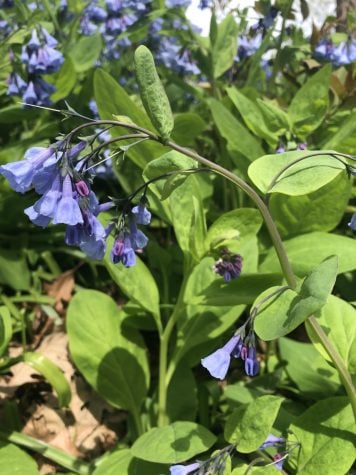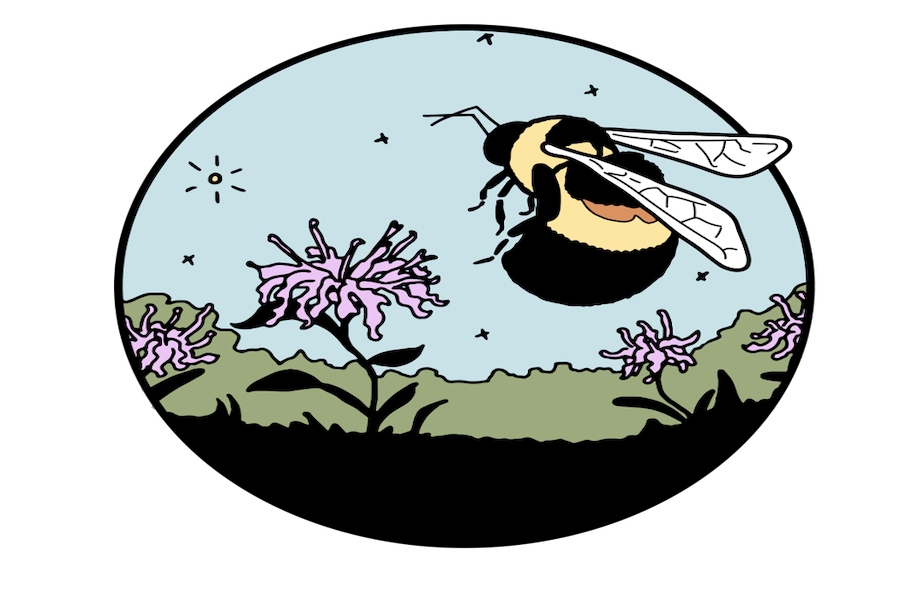Evanston Host Plant Initiative works to save endangered bee species
Illustration courtesy of Ava DeCapri.
DePaul environmental masters student Libby Shafer created the Evanston Host Plant Initiative to advocate for community gardening efforts to replenish the endangered rusty patched bumble bee
May 17, 2021
Evanston is abuzz with community efforts focused on saving the bees.
In partnership with Natural Habitat Evanston, the Evanston Host Plant Initiative is advocating for the inventory and planting of host plants for the endangered Rusty Patched Bumble Bee. The species’ population has declined about 87 percent in the last 20 years due to habitat loss, pesticides and pathogen spillover.
DePaul University environmental masters graduate student Libby Shafer launched the initiative as part of her thesis work. Saving pollinators, Shafer said, is important because they are central to ecosystems and human life because they help plants reproduce.
The rusty patched bumble bee is sustained by 38 known host plants, which are native plants pollinators need to survive. Shafer’s initiative encourages residents to document those host plants in their yard through the app iNaturalist and plant new ones. So far, more than 80 volunteers have signed up, she said, and she is continuing to recruit residents.
“There is a ton of enthusiasm in Evanston and in the Chicago area which is amazing,” Shafer said. “A lot of people are really wanting to do something and realizing that they can make a difference in their yard.”
Shafer emphasized the importance of a joint community effort to conserve pollinator species. She said the optimal foraging distance of the Rusty Patched Bumble Bee between flower and nest is 0.6 miles, so close networks of viable habitats are vital for replenishing this species.
To make the project more accessible, Shafer has received grant money to distribute to some residents in need of financial assistance for the purchase of host plants. In addition, she is hosting an event at the Lorraine H. Morton Civic Center on Thursday to teach residents how to use the iNaturalist app to inventory host plants and how to choose new plants for their yard.
In addition to the Evanston Host Plant Initiative, Evanston residents have also taken it upon themselves this year to make their community suitable for pollinator restoration.

With an $1,800 grant from ChangeX, a platform that helps to connect community projects to funding, Evanston resident Sarah Abu-Absi recruited 12 households on her block to form a large pollinator plant network. Through the grant, neighbors are reimbursed for the purchase of host plants from one of four approved vendors, including the Shady Grove Wildflower Farm, which has a booth at the Evanston Farmers’ Market.
The pollinator plant network acted as a common cause that brought her and her neighbors together, Abu-Absi said. The process her block took, she said, is replicable and hopes other neighbors will follow their lead.
“It’s extra work, and involves extra patience to do native plants and pollinator plant gardens,” she said. “So to have neighbors that you see almost every day or every week out in their gardens doing the same thing, it brings a little bit more joy and satisfaction to it.”
Abu-Absi emphasized the role native plant gardens play in mitigating climate change by absorbing carbon dioxide from the atmosphere, a greenhouse gas that traps in the Earth’s heat and contributes to global warming. These native plants also use less natural resources and chemical pesticides than common garden flowers which use selective breeding.
Leslie Shad, founder and co-lead of Natural Habitat Evanston, said Shafer’s project fit perfectly with her organization’s mission. Natural Habitat Evanston is focused on encouraging residents to garden “gently,” by taking actions like keeping their leaves on the ground and planting native plants, to allow insect and bird populations to flourish, she said.
Natural Habitat Evanston is helping spread the word by putting Shafer in contact with other environmental initiatives in Evanston and presenting the project at various city events, including plant sales. Shad is hopeful for the positive impact this partnership will have on local rusty patched bumble bee conservation.
“Having had sightings in Chicago, it’s not impossible that we’ll see this little bug,” Shad said.
Email: [email protected]
Twitter: @WKlunk
Related Stories:
—Community leaders discuss environmental justice at Citizens’ Greener Evanston Event
—Chicago Sculpture International artists build pollinator habitat sculpture












